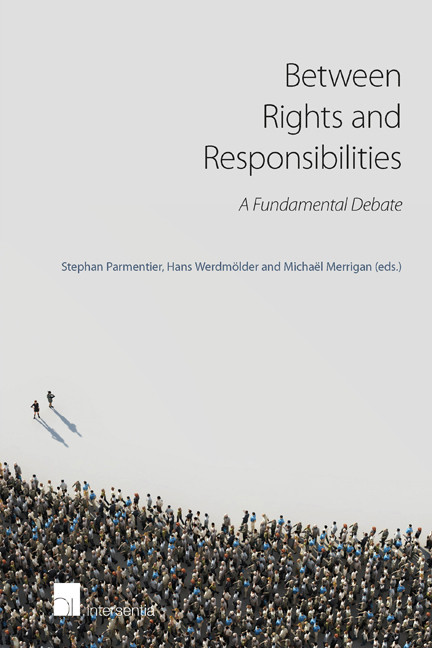Book contents
- Frontmatter
- Foreword
- Contents
- About the Authors
- Introduction: Towards an Integrated Vision of Rights and Responsibilities
- PART I FUNDAMENTAL RIGHTS AND FUNDAMENTAL RESPONSIBILITIES: SETTING THE SCENE
- Human Rights and Human Responsibilities. Setting the Ethical and the Conceptual Scene
- Rights, Responsibilities and Duties for the Civil Society. Moral Challenges Put Forward by the Millennium Development Goals
- Steering Clear of the Twin Shoals of a Rights-Based Morality and a Duty‑Based Legality
- Human Duties and Responsibilities for the Reinforcement of Human Rights. The Declaration of Human Duties and Responsibilities (1998)
- PART II RIGHTS AND RESPONSIBILITIES IN SPECIFIC CONTEXTS
- Declaration of Human Duties and Responsibilities
Steering Clear of the Twin Shoals of a Rights-Based Morality and a Duty‑Based Legality
from PART I - FUNDAMENTAL RIGHTS AND FUNDAMENTAL RESPONSIBILITIES: SETTING THE SCENE
Published online by Cambridge University Press: 22 November 2017
- Frontmatter
- Foreword
- Contents
- About the Authors
- Introduction: Towards an Integrated Vision of Rights and Responsibilities
- PART I FUNDAMENTAL RIGHTS AND FUNDAMENTAL RESPONSIBILITIES: SETTING THE SCENE
- Human Rights and Human Responsibilities. Setting the Ethical and the Conceptual Scene
- Rights, Responsibilities and Duties for the Civil Society. Moral Challenges Put Forward by the Millennium Development Goals
- Steering Clear of the Twin Shoals of a Rights-Based Morality and a Duty‑Based Legality
- Human Duties and Responsibilities for the Reinforcement of Human Rights. The Declaration of Human Duties and Responsibilities (1998)
- PART II RIGHTS AND RESPONSIBILITIES IN SPECIFIC CONTEXTS
- Declaration of Human Duties and Responsibilities
Summary
In considering the extent to which human rights must be matched by human responsibilities, we might begin by asking, responsibilities of whom? International law imposes manifold duties on States to respect, ensure and fulfil human rights. It places duties on non-state organisations as well. For example, international labour law calls on business corporations not to employ forced labour, while international humanitarian law binds armed guerrilla groups not to attack civilians.
This essay focuses on a particular class of duty bearers: individual human beings as they relate to one another and to society at the community, national and international levels. In the terms suggested by René Foqué in this volume, the first two parts of this essay argue that morally-based ‘duties’ and ethically-based ‘responsibilities’ are and should be more demanding than mere reciprocal respect for rights. The essay then goes on to contend that these higher moral and ethical standards cannot safely or feasibly be incorporated in what Foqué calls legallybased ‘obligations’.
THE POVERTY OF A RIGHTS-BASED MORALITY
Before considering individual obligations in a legal sense, I prefer to begin from an ethical or religious perspective. An erudite philosopher once suggested (or quipped) that human rights were the ‘new secular religion’ of the 20th century. That might be true in much of western Europe, especially if one were to read the Universal Declaration of Human Rights in its original, communitarian understanding, balancing rights with duties in an integral vision of how best to organise society in order to enrich human development and happiness. However, if human rights are understood through the interpretative lens more prevalent in practice over the last sixty years – as entitlements of individuals – then it diminishes the divine to elevate human rights to the theological plane.
A society based on rights-claims alone is not in and of itself a moral society. As commonly articulated in the form of individual entitlements, human rights can be exercised in ways which are inherently selfish. Human rights speak of my rights, my entitlements, my legal space, my dignity, my body, my privacy, and so on. Of course, in a world where the individual is often assaulted by State brutality or repression, these entitlements indeed have their urgency. They must be recognised, cherished and safeguarded. By themselves, however, they do not suffice to construct a moral society.
- Type
- Chapter
- Information
- Between Rights and ResponsibilitiesA Fundamental Debate, pp. 51 - 66Publisher: IntersentiaPrint publication year: 2016



